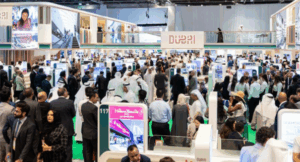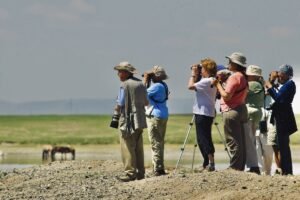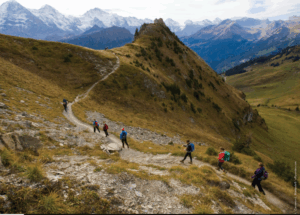TOURISM : Voices That Matter

Tourism has been among the hardest hit of all sectors by COVID-19 and no country has been unaffected, with restrictions on travel and a sudden drop in consumer demand leading to an unprecedented fall in international tourist numbers. It is imperative that we rebuild the tourism sector in a “safe, equitable and climate friendly” manner and so “ ensure tourism regains its position as a provider of decent jobs, stable incomes and the protection of our cultural and natural heritage “.
To this end, the UN Policy Brief provides Five Priorities for the restart of tourism, all aimed at ensuring a more resilient, inclusive and carbon neutral sector. These priorities are:
1. Mitigate socio-economic impacts on livelihoods, particularly women’s employment and economic security.
2. Boost competitiveness and build resilience, including through economic diversification and encouragement of MSMEs.
3. Advance innovation and digital transformation of tourism
4. Foster sustainability and green growth
5. Enhanced focus on coordination, and responsible leadership
Antonio Guterres , United Nations Secretary-General
——————————————————————-
International arrivals plunged 81% in July and 79% in August, traditionally the two busiest months of the year and the peak of the Northern Hemisphere summer season. The drop until August represents 700 million fewer arrivals compared to the same period in 2019 and translates into a loss of US$ 730 billion in export revenues from international tourism.
This is more than eight times the loss experienced on the back of the 2009 global economic and financial crisis. This unprecedented decline is having dramatic social and economic consequences, and puts millions of jobs and businesses at risk. This underlines the urgent need to safely restart tourism, in a timely and coordinated manner.
Zurab Pololikashvili , Secretary-General , World Tourism Organization (UNWTO)
——————————————————————-
If the current restrictions to international travel continue through to the end of 2020 – resulting in a limited recovery – the impact will be devastating, with as many as 174m million jobs lost globally. Our latest data reveals the gravity of the long-term negative impact facing the global Travel & Tourism sector, if we don’t work together to resume international travel immediately.
As travel restrictions around the world remained in place over the summer months, our estimates report an increase from 121m, to 143m jobs lost. In the space of just four months, our study has shown a further 22m jobs under threat worldwide. This is devastating news, and we need international coordinated action now. The sector’s recovery will be delayed even further, with more jobs lost, unless quarantines are replaced with rapid, cost-effective testing at airports on departure, and air corridors. The longer we wait, the more the ailing Travel & Tourism sector faces total collapse.
Gloria Guevara , President & CEO , World Travel & Tourism Council (WTTC)
——————————————————————-
COVID-19 has drastically changed the entire travel and tourism landscape, and, some would argue, changed it forever. Since March of this year, the travel and tourism industry has almost entirely come to a complete standstill and there is little hope for recovery before 2021.
While the road to recovery will be long and arduous, I am confident we will eventually travel again. To get there, beyond just close cooperation between the public and private sectors, we will need to be innovative, creative, and resourceful. If we do that, I am sure that we will rebuild a more robust and more responsible travel and tourism industry.
Dr. Mario Hardy , Chief Executive Officer , Pacific Asia Travel Association (PATA)
—————————————————————–
The COVID-19 crisis is a human and health tragedy. It has also become an economic crisis.The world faces a sharp and deep recession as economic activity slows. Nowhere is this more visible than in the rows of airplanes parked at airports with nowhere to go. A thriving industry, connecting the world with 4.5 billion passenger journeys and transporting 60 million tonnes of freight a year, has been brought to a shuddering halt.
Aviation is fully behind government efforts to fight this contagion. But that has severe consequences for the airline industry, the 2.7 million people who are directly employed by airlines, and the 65.5 million jobs in the value chain that aviation supports.There is very little money coming into the industry. And with two million flight cancellations already, a huge number of travelers have had their trips disrupted. Airlines are doing their best to find solutions for their customers. But in this totally unprecedented situation, there are no easy solutions.
Alexandre de Juniac , DG & CEO , Int. Air Transport Association(IATA)
——————————————————————
While we welcome the rapid development and deployment of vaccines, there will be a considerable period before they are widely available so, during the transition period, tests and vaccines together will play a key role on the industry recovery.
As they become more available for travellers, there must be a proportionate approach to vaccination before travel balanced with a risk-based approach to testing. Just as quarantine effectively halted the industry, a universal requirement for vaccines could do the same and a coordinated and risk-based approach to testing and vaccination going forward will provide passengers with a safe travel environment and foster confidence in air travel.
Luis Felipe de Oliveira, Airports Council International (ACI) World Director General
—————————————————————-
“Given the enormous challenge of achieving widespread vaccine distribution and availability, diagnostics will remain paramount for the foreseeable future. It is imperative that governments and industry collaborate to enable a hybrid regime of risk management interventions which may include testing, vaccines, and other measures as part of a broader hierarchy of controls.
Christoph Wolff, Head of Mobility , World Economic Forum
—————————————————————-
“Global mobility is a powerful economic driver – one that supports many businesses and livelihoods currently facing deeply uncertain futures. Hinging the revival of international travel on an extended global vaccine roll out would continue to jeopardise the futures of these businesses as well as those who rely on travel to safeguard their livelihoods. As a better approach, rapid and reliable systematic testing can effectively stem the spread of the virus today, allow travel to resume safely and enable an effective reboot of the global economy.
John Denton, Secretary General , International Chamber of Commerce (ICC)
—————————————————————-
Our industry is experiencing the worst crisis in its history. Staying ahead of trends and ideas is more important than ever. There is a huge desire to exchange views. That is why, at the forward-looking events of ITB Asia 2020 Virtual, leading speakers will be discussing how Asia’s travel industry can harness intelligent strategies to make sure it remains future-proof even in a challenging environment.
In the wake of the latest developments, discussions on how the industry can navigate through recovery will play a key role. The challenges facing our industry are global, so it is all the more important to interact with others across borders.
Dr Martin Buck , Senior Vice President,travel and logistics , Messe Berlin
——————————————————————-
Tourism Ministers from Israel, United Arab Emirates and Kingdom of Bahrain will come together at WTM Virtual for the first time since signing historic agreements to normalize relations in September. WTM Virtual session entitled Tourism: The Path to Peace in the Middle East ‘will provide a fascinating insight into how co-operating on tourism and trade – encouraging people to engage with different cultures and experience new places, sample different food and take part in different activities – can advance peace.
WTM has always understood the unique way that travel promotes tolerance, empathy and cross-cultural understanding. When people travel, they form friendships, engage in dialogue and are able to see things from a different perspective. When flight paths open up, the prospect for new business becomes a reality, which creates wealth and opportunity for destinations and their citizens. The post-COVID possibilities are endless for this region and we’re excited that WTM Virtual has been able to facilitate such an important meeting and play a part in history.
Simon Press , Senior Director , World Travel Mart(WTM)














